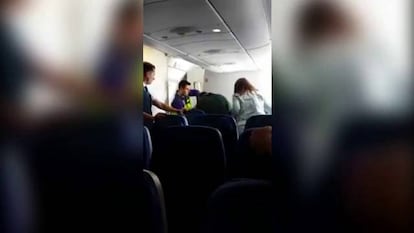Deportation flights violating migrants’ rights, says Ombudswoman
Procedures regarding onboard medical and language assistance are not being followed


Spain’s Ombudswoman has accused authorities of violating the basic rights of foreigners who are deported by air to their home countries by failing to provide legal aid, linguistic assistance or medical support.
Soledad Becerril called for an end to the policy, saying it only “adds to the pain and suffering of people trying to escape war and hunger, or who are simply looking for a better future.”
Becerril accuses Frontex, the European agency that charters deportation flights from EU member states, of “practices that contravene its code of conduct.”
Onboard incident under scrutiny
Becerril's comments came two weeks after Spain’s National Police said it was investigating an incident aboard a flight to the Dominican Republic during which officers were filmed beating and restraining a man who was being deported.
The video was released last month by Stop Deportación, an organization calling for an overhaul of Spain’s policy of returning undocumented migrants to their home countries.
“These flights are granted legal protection under the macabre repatriation protocols, which make no attempt to guarantee the rights of people, but instead allow police impunity by permitting all kinds of violence, as we can see in the video,” said Stop Deportación in a press statement.
The Spanish government approved the deportation by air of more than 26,000 immigrants between 2010 and 2014. The budget for deportations this year is €12.1 million.
Immigrant support groups also criticize the Spanish government’s recent approval of so-called express deportations, which are carried out within 72 hours, saying this seriously reduces immigrants’ right to a fair hearing. The government says in 2013 it deported 6,642 people directly from police stations, along with 4,726 more from Immigrant Holding Centers (CIEs).
Becerril’s report notes that Frontex did not order the presence of a physician on several deportation flights that it monitored. On others, there was no interpreter. The migrants were sometimes not informed about the possibility of filing a complaint against violations of their fundamental rights.
The study also underscored the absence of an onboard defibrillator or refrigerator to store medicine.
“On all monitored deportation flights, there was no video recording as stipulated in the code, especially for difficult cases,” adds the study.
Becerril also wants officers accompanying deportees aboard flights to be identified, and says that protocols need to be established for dealing with children and pregnant women. “These cases should have no contact with people other than their own families,” says Becerril.
But Frontex has rejected any responsibility for the conditions on deportation flights, underscoring that this falls to the member states.
“We don’t have any medical personnel. This must be provided by the country organizing the flight, just like the monitoring, the interpreters and the bodyguards,” said Gil Arias Fernández, deputy executive director at Frontex.
Frontex spent €1.85 million last year on seven flights carrying 400 deportees from different EU member states, returning them to Pakistan, Colombia, Ecuador and the Dominican Republic.
Tu suscripción se está usando en otro dispositivo
¿Quieres añadir otro usuario a tu suscripción?
Si continúas leyendo en este dispositivo, no se podrá leer en el otro.
FlechaTu suscripción se está usando en otro dispositivo y solo puedes acceder a EL PAÍS desde un dispositivo a la vez.
Si quieres compartir tu cuenta, cambia tu suscripción a la modalidad Premium, así podrás añadir otro usuario. Cada uno accederá con su propia cuenta de email, lo que os permitirá personalizar vuestra experiencia en EL PAÍS.
¿Tienes una suscripción de empresa? Accede aquí para contratar más cuentas.
En el caso de no saber quién está usando tu cuenta, te recomendamos cambiar tu contraseña aquí.
Si decides continuar compartiendo tu cuenta, este mensaje se mostrará en tu dispositivo y en el de la otra persona que está usando tu cuenta de forma indefinida, afectando a tu experiencia de lectura. Puedes consultar aquí los términos y condiciones de la suscripción digital.








































